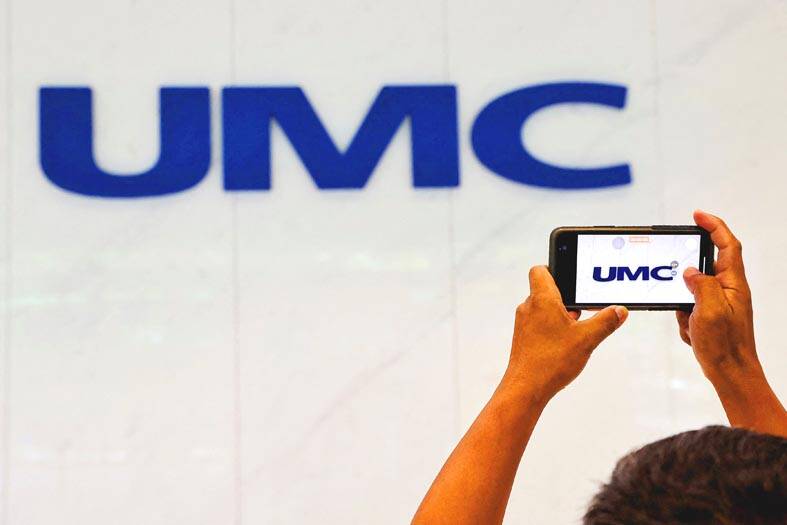United Microelectronics Corp (UMC, 聯電) yesterday said that it has no immediate plans to set up a production site in the US amid speculation that the Taiwanese company might come under pressure to invest in the US market.
The comments came after the Chinese-language Mirror Media reported earlier yesterday that with US president-elect Donald Trump set to return to the White House next month, there might be more pressure on UMC, Taiwan’s second-largest contract chipmaker, to invest in the US.
The report cited unnamed industrial sources who said the pressure could arise because the US is the largest semiconductor market in the world and also due to Trump’s tariff threats.

Photo: Ann Wang, Reuters
The report also cited an American Institute in Taiwan (AIT) Facebook post on Nov. 21 that said AIT Director Raymond Greene had visited UMC.
However, UMC said Greene was making a scheduled visit to the company and did not expand on any details.
UMC said that it has no plans to invest in the US at the moment.
It said it was focusing its resources on its ongoing project with US chipmaker Intel Corp.
In January, UMC and Intel announced that they would develop a 12-nanometer semiconductor process platform.
Production at Intel’s Ocotillo Technology Fabrication site in Arizona is set to begin in 2027.
The AIT said in its Facebook post that Greene met with UMC’s top leadership to discuss the company’s future growth strategies and to exchange views on key industry topics.
The AIT described the Taiwanese chipmaker as “a global leader in mature-node foundry services, which are essential for manufacturing the chips that power our mobile devices, connected cars, industrial equipment and” Internet of Things.
The institute said it recognizes Taiwan’s crucial role in the global semiconductor supply chain and would carry on working to ensure that global supply chains stay secure and resilient.
Taiwan Semiconductor Manufacturing Co (TSMC, 台積電), the world’s largest contract chipmaker, is investing US$65 billion in Arizona.
TSMC, which dominates the global high-end chip market, is building two advanced wafer fabs and planning another.
According to Taipei-based market information advisory firm TrendForce Corp (集邦科技), UMC was the fourth-largest company in the global pure-play wafer foundry market in the third quarter of this year, following TSMC, South Korea’s Samsung Electronics Co and China’s Semiconductor Manufacturing International Corp (中芯).

MULTIFACETED: A task force has analyzed possible scenarios and created responses to assist domestic industries in dealing with US tariffs, the economics minister said The Executive Yuan is tomorrow to announce countermeasures to US President Donald Trump’s planned reciprocal tariffs, although the details of the plan would not be made public until Monday next week, Minister of Economic Affairs J.W. Kuo (郭智輝) said yesterday. The Cabinet established an economic and trade task force in November last year to deal with US trade and tariff related issues, Kuo told reporters outside the legislature in Taipei. The task force has been analyzing and evaluating all kinds of scenarios to identify suitable responses and determine how best to assist domestic industries in managing the effects of Trump’s tariffs, he

TIGHT-LIPPED: UMC said it had no merger plans at the moment, after Nikkei Asia reported that the firm and GlobalFoundries were considering restarting merger talks United Microelectronics Corp (UMC, 聯電), the world’s No. 4 contract chipmaker, yesterday launched a new US$5 billion 12-inch chip factory in Singapore as part of its latest effort to diversify its manufacturing footprint amid growing geopolitical risks. The new factory, adjacent to UMC’s existing Singapore fab in the Pasir Res Wafer Fab Park, is scheduled to enter volume production next year, utilizing mature 22-nanometer and 28-nanometer process technologies, UMC said in a statement. The company plans to invest US$5 billion during the first phase of the new fab, which would have an installed capacity of 30,000 12-inch wafers per month, it said. The

Taiwan’s official purchasing managers’ index (PMI) last month rose 0.2 percentage points to 54.2, in a second consecutive month of expansion, thanks to front-loading demand intended to avoid potential US tariff hikes, the Chung-Hua Institution for Economic Research (CIER, 中華經濟研究院) said yesterday. While short-term demand appeared robust, uncertainties rose due to US President Donald Trump’s unpredictable trade policy, CIER president Lien Hsien-ming (連賢明) told a news conference in Taipei. Taiwan’s economy this year would be characterized by high-level fluctuations and the volatility would be wilder than most expect, Lien said Demand for electronics, particularly semiconductors, continues to benefit from US technology giants’ effort

‘SWASTICAR’: Tesla CEO Elon Musk’s close association with Donald Trump has prompted opponents to brand him a ‘Nazi’ and resulted in a dramatic drop in sales Demonstrators descended on Tesla Inc dealerships across the US, and in Europe and Canada on Saturday to protest company chief Elon Musk, who has amassed extraordinary power as a top adviser to US President Donald Trump. Waving signs with messages such as “Musk is stealing our money” and “Reclaim our country,” the protests largely took place peacefully following fiery episodes of vandalism on Tesla vehicles, dealerships and other facilities in recent weeks that US officials have denounced as terrorism. Hundreds rallied on Saturday outside the Tesla dealership in Manhattan. Some blasted Musk, the world’s richest man, while others demanded the shuttering of his